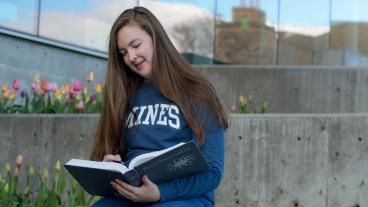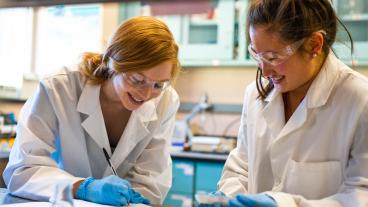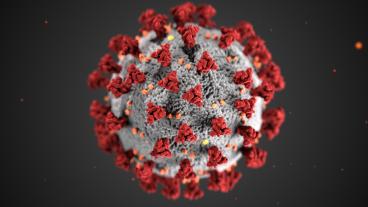GOLDEN, Colo., May 2, 2014 – A 2013 pilot program funding research collaboration between Children’s Hospital Colorado-University of Colorado and Mines has been so successful over the past year, the institutions have announced funding for four projects in 2014.
The recipients and their projects are:
- Brian Trewyn (Mines) - Colm Collins (CU School of Medicine), "Development of a novel copolymer delivery system for the treatment of Inflammatory Bowel Diseases"
- Cecilia Diniz Behn (Mines) - Melanie Cree Green (Pediatric Endocrinology – Children’s Colorado), "Hepatic and Adipose Insulin Resistance in Polycystic Ovarian Syndrome"
- Ozkan Celik (Mines) - Richard F. ff. Weir (Bioengineering CU-Denver, Children’s Colorado), "A Novel Finger Joint Employing High Speed Low Torque Transfer for use in a Powered Finger Prosthesis"
- Anne Silverman (Mines) - Travis Heare (Orthopedics – Children’s Colorado), "Evaluating the Functional Muscle Units in Van Ness Rotationplasties"
The 2013 research has already led to further funding and the intent to collaborate further.
Melissa Krebs, from Mines, and Karin Payne, from CU, worked on “Dual Delivery Biomaterial System for the Treatment of Growth Plate Injuries.”
“Growth plate cartilage injuries have devastating consequences to the growth of young children. The overall goal of this proposal was to engineer a novel delivery system that can regenerate the growth plate and prevent significant life-long orthopedic problems,” said Krebs, noting the success of such a therapy would not only be beneficial to growth plate injuries due to trauma, but can be further applied to growth plate disruptions due to osteosarcoma or infection as well as other clinical applications.
“The funding provided by this program was very valuable for us in establishing a strong collaboration and allowing us to obtain substantial preliminary data,” said Krebs.
Krebs was awarded an NSF BRIGE grant ($175,000 total for two years) to further pursue a variation of this delivery system.
Stephen Boyes, from Mines, and Sven-Olrik Strubel, of Children’s Colorado, collaborated on “Bone Regeneration Using Biodegradable Polymer Scaffolds.”
Bone is one of the most transplanted tissues, second to blood, but current treatment options have significant drawbacks. The research by Boyes and Strubel aims to bridge the gap between the need for, and the current lack of, ideal bone grafting materials using polymers.
“I am currently on sabbatical at the University of Colorado Anschutz Medical Campus, and know firsthand there is much potential for collaboration, but finding money to get the project started and generating preliminary results can be very difficult. Programs like the Mines-Children’s Colorado seed grant enable researchers with good ideas the ability to start new projects and generate results that will hopefully lead to more substantial funding in the future,” Boyes said.
Keith Neeves, from Mines, and Shama Ahmad, from CU, worked on “Air Flow-dependent Modifications of Airway Epithelial Basal/Progenitor Cell Phenotype: Implications in Cystic Fibrosis Disease Pathogenesis.”
“The ultimate goal of this collaboration is to use microfluidic models of pulmonary airways to test therapeutic strategies,” said Neeves.
The lung-on-a-chip device developed by Neeves and Ahmad could help the medical community identify better treatment options for those afflicted with cystic fibrosis; a chronic, inherited disease that affects the lungs and digestive systems of more than 70,000 people worldwide.
Contact:
Karen Gilbert, Colorado School of Mines / 303-273-3541 / kgilbert@mines.edu
Melissa Vizcarra, Children’s Hospital Colorado / 303-890-8314 / Melissa.Vizcarra@childrenscolorado.org



